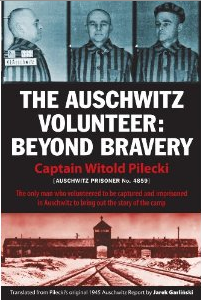 In the summer of 1945, a Polish officer serving with British forces in Italy wrote an extraordinary memoir. In 1940, as the London-based Polish government-in-exile puzzled over what might be going on in the still little-known camp the Nazis had set up in Auschwitz, Pilecki—then 39 and a founder of the Polish Resistance—volunteered to find out. On Sept. 19, he deliberately wandered into the middle of an SS street roundup of military-aged Poles, and soon learned.
In the summer of 1945, a Polish officer serving with British forces in Italy wrote an extraordinary memoir. In 1940, as the London-based Polish government-in-exile puzzled over what might be going on in the still little-known camp the Nazis had set up in Auschwitz, Pilecki—then 39 and a founder of the Polish Resistance—volunteered to find out. On Sept. 19, he deliberately wandered into the middle of an SS street roundup of military-aged Poles, and soon learned.
Auschwitz was not yet an organized, industrial-production death camp, dedicated to killing millions of Jews as quickly as possible. But it was already designed to kill—by overwork, by starvation, disease and random, almost casual murder—the Poles who made up the early inmate population. That much was evident to Pilecki on his arrival, when the new prisoners were driven from their freight cars by rifle butts and guard dogs. One man was told to run to a post; when he did, the SS machine-gunned him. Another 10 prisoners were then pulled from the crowd and shot, the price of their “collective responsibility” for the “escape,” according to the guards. (All this, noted Pilecki, who astonishingly never lost his profound sense of irony, before the new inmates had seen the infamous sign above Auschwitz’s gates, “Work makes you free.” He says, “It was only later that we learned to understand it properly.”)
Pilecki, as revealed in his 1945 report—made all the more affecting by its stark, just-the-facts tone—responded magnificently to his situation, organizing underground support groups for the prisoners, smuggling out information, and even managing to escape in 1943. After the war, Pilecki secretly returned to his country to investigate the Soviet occupation. He was captured and executed in 1948, and accounts of his time in the death camp were suppressed until the collapse of the U.S.S.R four decades later. In 2006 Pilecki, one of the unsung heroes of the war, was awarded Poland’s highest medal.